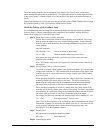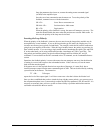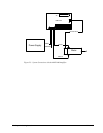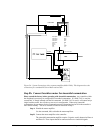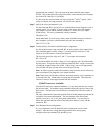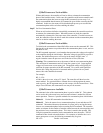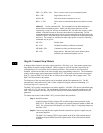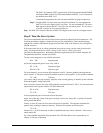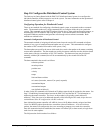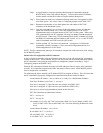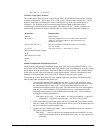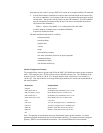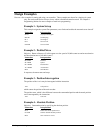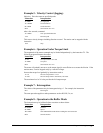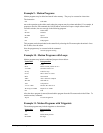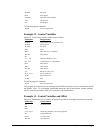
28 • Chapter 2 Getting Started DMC-3425
Step 10. Configure the Distributed Control System
The final step in Getting Started with the DMC-3425 distributed control system is to configure the
individual controllers as their respective axes in the system. For more information on the operation of
distributed control, please refer to Chapter 4.
Configuring Operation for Distributed Control
There are two methods for configuring a distributed control system; an automatic mode or a manual
mode. The automatic mode uses a single command (HC) to configure all the slaves in a particular
system. This command uses the BOOTP packets from the slaves, along with configuration jumpers, to
automatically select IP addresses and set up the system. In the manual mode, slave controllers are
assigned IP addresses and then configured into axes through various software commands. Both
methods are outlined below.
Automatic Configuration of Distributed Control
The automatic method of assigning a distributed control network uses the HC command to indicate
number of axes, type of communication and update rate of a system. This command also configures
the number of IOC extended I/O modules in the system, if any.
The data update rate specifies the rate at which each slave sends a data packet to the master containing
current status information. The data records are used by the master controller to make decisions based
on the status of the slave controllers or IOC-7007 modules. This data record rate may be selected
manually with the QW command, but will be set automatically by the second field of the HC
command.
The data contained in the record is as follows:
reference position
encoder position
position error
velocity
torque
limit and home switches
axis status (in motion, motor off, at speed, stopcode)
uncommitted inputs
uncommitted outputs
user defined variables (4)
In order for the HC command to be initiated, an IP address must already be assigned to the master. See
Step 5 “Establishing Communication between the DMC-3425 and the host PC” for information on
addressing the master controller. The slaves, in this method, will typically remain without IP
addresses. If the slaves are to be addressed manually while still using the HC mode, skip to the next
section Manual Slave IP configuration with HC command.
Once initiated, the master controller will ARP for slaves with IP address already assigned, and then
‘listen’ for BOOTP packets from the slave controllers without IP addresses. As it receives these
packets, the master will configure the slave axes according to jumpers set on each slave controller.
Once this connection has been established, the master will initiate QW, or data records, to begin from
each slave for status updates.
The full procedure for this method is as follows:



